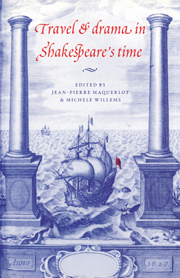Book contents
- Frontmatter
- Contents
- List of contributors
- 1 Introduction
- 2 Foreign relations in Jacobean England: the Sherley brothers and the ‘voyage of Persia’
- 3 ‘The naked and the dead’: Elizabethan perceptions of Ireland
- 4 The Elizabethans in Italy
- 5 Tragic form and the voyagers
- 6 Nationality and language in Thomas Kyd's The Spanish Tragedy
- 7 Marlowe's Argonauts
- 8 Pirates and ‘turning Turk’ in Renaissance drama
- 9 The wrong end of the telescope
- 10 ‘Travelling hopefully’: the dramatic form of journeys in English Renaissance drama
- 11 ‘Seeing things’: Amazons and cannibals
- 12 Industrious Ariel and idle Caliban
- 13 The New World in The Tempest
- 14 ‘What's past is prologue’: metatheatrical memory and transculturation in The Tempest
- 15 Lope de Vega and Shakespeare
- Index
14 - ‘What's past is prologue’: metatheatrical memory and transculturation in The Tempest
Published online by Cambridge University Press: 22 September 2009
- Frontmatter
- Contents
- List of contributors
- 1 Introduction
- 2 Foreign relations in Jacobean England: the Sherley brothers and the ‘voyage of Persia’
- 3 ‘The naked and the dead’: Elizabethan perceptions of Ireland
- 4 The Elizabethans in Italy
- 5 Tragic form and the voyagers
- 6 Nationality and language in Thomas Kyd's The Spanish Tragedy
- 7 Marlowe's Argonauts
- 8 Pirates and ‘turning Turk’ in Renaissance drama
- 9 The wrong end of the telescope
- 10 ‘Travelling hopefully’: the dramatic form of journeys in English Renaissance drama
- 11 ‘Seeing things’: Amazons and cannibals
- 12 Industrious Ariel and idle Caliban
- 13 The New World in The Tempest
- 14 ‘What's past is prologue’: metatheatrical memory and transculturation in The Tempest
- 15 Lope de Vega and Shakespeare
- Index
Summary
The Tempest has occasioned an astounding dialogue across times and continents. In particular, Caliban has made an amazing career through the ages. In the course of that career, during which he managed to become Prospero's serious rival for critical attention, he graduated from Renaissance wild or primitive man, savage and slave to lecherous drunk, cannibal and savage monster reflecting European fears of the non-European world, but also noble being in the eighteenth century; to a victim of oppression from 1838, when the modern Caliban seems to have been born, ape and Darwin's missing link, downtrodden peasant and Saxon serf; to the ‘Americanist Caliban’ since 1898; Fritz or the Boche at the end of the First World War and finally colonialized black nationalist and Irish peasant.
We know from Montaigne, of course, writing in 1588 that Renaissance Europe had become curious about the newly discovered exotic ‘Other’. Also we have known about the travel literature Shakespeare may have used for The Tempest since Malone, and we know about Frobisher bringing home strange kinds of people in 1576 whom he described as wild beasts as did Hakluyt, and that Indians began to appear in masques from 1613. Yet we also know that the ‘Americanist Caliban’ remained invisible for three centuries, and that we have a hard time trying to detect actual Indian traits in Caliban. What, then, makes Caliban, in the words of Meredith Anne Skura, a ‘walking screen for projection’?
- Type
- Chapter
- Information
- Travel and Drama in Shakespeare's Time , pp. 223 - 238Publisher: Cambridge University PressPrint publication year: 1996
- 4
- Cited by



